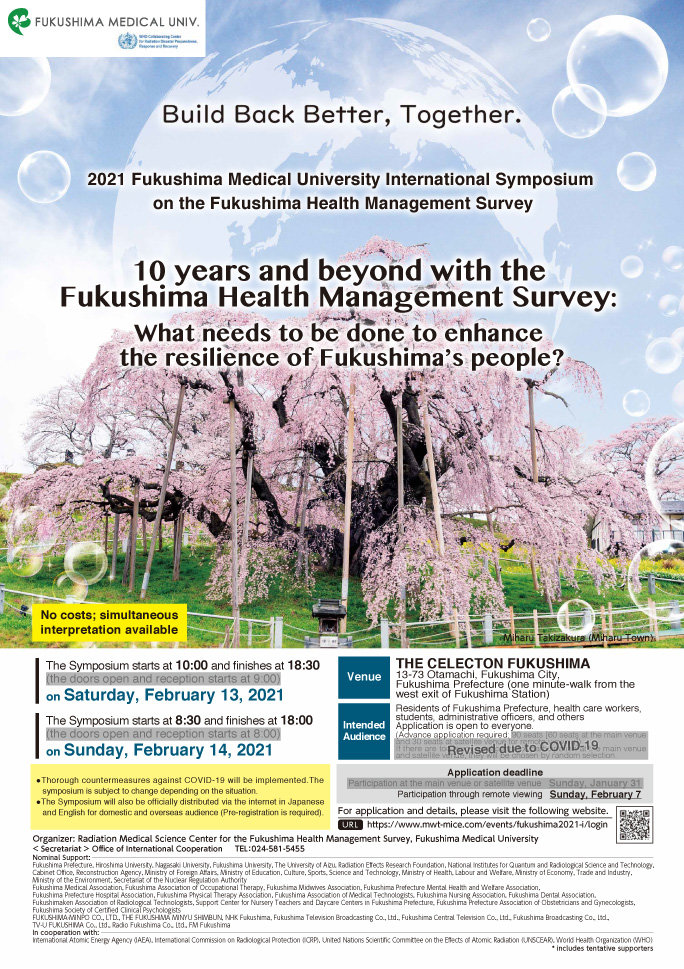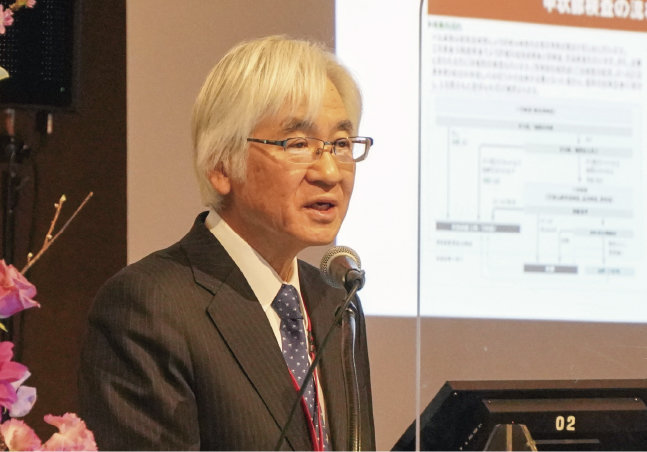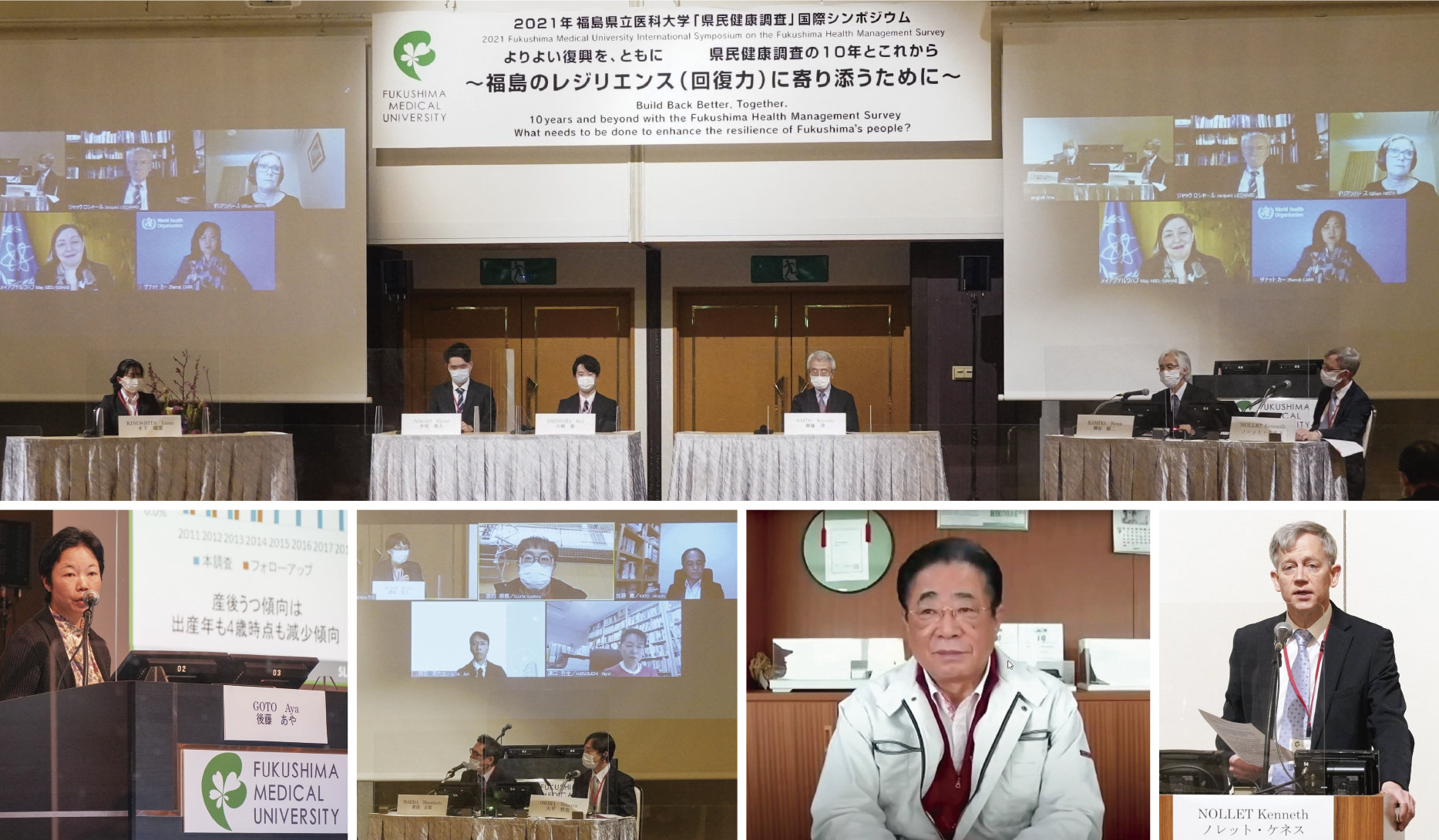News
2021 Fukushima Medical University International Symposium on the Fukushima Health Management Survey
“2021 Fukushima Medical University International Symposium on the Fukushima Health Management Survey” convened. Thank you for all your cooperation and understanding. Please see the Event report for details.

Nearly a decade has passed since the Fukushima Daiichi Nuclear Power Plant accident. Our 2021 symposium is “10 years and beyond with the Fukushima Health Management Survey: What needs to be done to enhance the resilience of Fukushima’s people?” This forward-looking event will address our current situation, challenges, and future prospects while revisiting efforts of the past 10 years.As this symposium is open to the general public, anybody, including current or former residents of Fukushima Prefecture, health care workers, students, administrators, etc., can participate (preregistration is required).
As with last year’s symposium, we will implement COVID-19 prevention measures at the venue. In addition, this symposium will be broadcast in English and Japanese on our official website, to accommodate world-wide participation while avoiding crowded/close contact (preregistration is required).
(Added on January 15)
January 15 Acceptance of applications for participating in the international symposium at the venue has been suspended.
Event report
February 22, 2021

In the tradition of previous years, our 3rd International Symposium on the Fukushima Health Management Survey convened February 13 and 14 at The Celecton Fukushima. In contrast to previous years, only Fukushima Medical University staff, some domestic speakers, and media representatives were physically present at the venue. Online participation was arranged in response to the coronavirus pandemic. Thus, while our intended audience included Fukushima residents, healthcare providers, students, administrative professionals, and other stakeholders, on-line distribution enabled a wider, global audience.
Due to a substantial earthquake originating off the Pacific coast of Fukushima on the night of February 13, some speakers intending to be at The Celecton participated on-line. Thanks to everyone’s cooperation, the program was successfully completed even with such unexpected circumstances. We sincerely extend our gratitude.
At the event, Executive Director KAMIYA Kenji, along with other doctors and researchers from FMU and cooperating institutions, presented the results of the Fukushima Health Management Survey and related analyses and findings.
Six invited experts from overseas offered their perspectives online. Residents dedicated to the recovery of Fukushima and FMU students added their experiences and thoughts. Lively discussions addressed questions submitted from online participants. Even with such a successful event, not all questions could be answered in the allotted time, but those questions will guide our communication efforts between now and the next symposium.
As we continue to play a role in the revitalization and reconstruction of Fukushima by watching over the health of our residents, the Center, as part of a healthcare system, will endeavor to help people better understand their individual and community circumstances by disseminating results and lessons learned from the Fukushima Health Management Survey as simply and clearly as possible, but always based on science.
- Event program and presentation summaries are here.

Event Outline/Objective
| Name | 2021 Fukushima Medical University International Symposium on the Fukushima Health Management Survey |
|---|---|
| Date | Feb. 13 (Sat) 10:00 – 18:30 (Venue opens and, registration starts from 9 am)(Sun) 8:30 -18:00 (Venue opens and, registration starts from 8 am) *Simultaneous interpretation provided |
| Venue | The Celecton Fukushima 3rd Floor, 13-73 Otamachi Fukushima City, Across from JR Fukushima Station West Exit Tel:024-531-1111 |
| Organizer | Radiation Medical Science Center for the Fukushima Health Management Survey, Fukushima Medical University |
| Capacity | Pre-registration required(Online viewing only) |
| Participation Fee | None |
Objective
Nearly 10 years have passed since the Great East Japan Earthquake, subsequent tsunami, and nuclear accident of March, 2011. Recovery and revitalization of Fukushima have steadily progressed, including the resumption of full service along Japan Railway’s Pacific-coast Joban Line in March, 2019. The prefecture has also endeavored, with many and various supporters, to address harmful rumors and revitalize local industries while preserving essential memories of the disaster.
Yet, the light of progress still casts some shadows in today’s Fukushima, as progress in revitalization is punctuated by difficult challenges. Last year’s typhoons and the recent COVID-19 pandemic have added physical and mental burdens to Fukushima residents and hampered our revitalization efforts.
Under these circumstances, Fukushima Medical University’s Radiation Medical Science Center continues to conduct the Fukushima Health Management Survey (FHMS), as commissioned by Fukushima Prefecture in 2011, endeavoring to assess the health conditions of Fukushima residents and provide personalized care and health promotion support suited to individual needs.
As 2021 will be the milestone 10th year since our disaster, this next symposium will reflect on the progress of the FHMS, which continues to be a foundation to strengthen community resilience. By sharing knowledge and experience of renowned experts in and outside Japan, we aim to continue advancing the recovery and revitalization of Fukushima along with a corresponding sense of safety in a changing world. This time, our focus will include the FHMS Pregnancy and Birth Survey. Health care for evacuees and their current status, challenges, and future prospects will also be addressed.
Topic: 2021 Fukushima Medical University Symposium
Opening
February 13 (Sat) 10:00-11:30
The Fukushima Health Management Survey is commissioned by Fukushima Prefecture, and has been implemented with the cooperation of local people, medical institutions, and government agencies such as the Ministry of Environment and the Reconstruction Agency, as well as international organizations. After opening remarks, Dr. Kamiya Kenji, Executive Director of this Center, will provide a brief overview of the Fukushima Health Management Survey.
Session 1: Pregnancy and Birth Survey and parenting support
February 13 (Sat) 12:30-15:00
Center staff with relevant experience will explain efforts in support of the Pregnancy and Birth Survey through FY2020. In addition, citizens with childrearing experience in the prefecture after the nuclear accident will share their stories and thoughts on reconstruction.
Session 2: Current Status and Future Perspectives on Thyroid Ultrasound Examinations (TUE)
February 13 (Sat) 15:10-18:30
Childhood thyroid cancer became a health concern following the Chernobyl disaster, prompting concerns about Fukushima, for which authorities report that “at present no causal relationship can be established between radiation exposure and prevalence of thyroid cancer” (see the report from the 2020 symposium). In this session, experts will discuss the current status of the Thyroid Ultrasound Examinations and other related topics.
Session 3: Physical and mental health care for evacuees and their recovery
February 14 (Sun) 8:30-12:00
Ten years after the nuclear accident, improving both the physical and mental health of evacuees, including those outside Fukushima Prefecture, has become an increasingly important topic. We will explain the results of the Comprehensive Health Check and Mental Health and Lifestyle Survey, and discuss lessons and future prospects from different perspectives, including within disaster-affected areas, outside the prefecture, and from abroad.
Session 4: What needs to be done to enhance the resilience of Fukushima’s people?
February 14 (Sun) 13:00-14:20
Dr. Kato Hiroshi has focused on providing mental health support following various disasters, starting with the Great Hanshin Earthquake in 1995. Soma City Mayor Tachiya Hidekiyo has demonstrated powerful leadership in his efforts at reconstruction in Soma City. This session represents both a valuable opportunity for our center to better bolster the “resilience” of Fukushima Prefecture through the Health Management Survey, and an excellent opportunity for all citizens to learn from their valuable experiences.
Session 5: Collaboration with International Organizations
February 14 (Sun) 14:40-17:45
year since the Fukushima Health Management Survey started, experts from international organizations will talk about the various activities they have undertaken, including radiation education, mental health, and lessons learned from the nuclear accident. Dr. Gillian Hirth, Chair of UNSCEAR (United Nations Scientific Committee on the Effects of Atomic Radiation), will give a special lecture on the latest status of UNSCEAR’s 2020 report on the nuclear accident, to be released in Japan in the near future.
Program: Day 1 February 13 (Sat)
*Due to measures taken to prevent coronavirus presentation of speakers marked with * was pre-recorded videos,while discussion was via live internet.
| 9:00 | Main venue opens/ registration starts |
|---|---|
| 9:30 | Web streaming starts (for those who pre-registered) |
Opening Session
| 10:00 | Symposium Starts: General MC - Kenneth NOLLET (FMU) Opening Remarks from the organizer TAKENOSHITA Seiichi (President of Fukushima Medical University (fmu.ac.jp) |
|---|---|
| 10:15 | Welcome remarks UCHIBORI Masao (Governor of Fukushima Prefecture) (Planned) Congratulatory remarks YOKOYAMA Shinichi, State Minister for Reconstruction, Reconstruction Agency (planned) HORIUCHI Noriko, State Minister of the Environment, Ministry of the Environment (Planned) |
| 10:30 | Congratulatory remarks from international organization officials(video messages) |
| 10:50 | Introduction: Summarizing results from 10 years of the Fukushima Health Management Survey (FHMS) Chair: OHTO Hitoshi (FMU) Speaker: KAMIYA Kenji (Executive Director, Radiation Medical Science Center for the Fukushima Health Management Survey, FMU) |
| 11:30 | End of Opening Session (lunch break) |
Part 1: FHMS at Present
Session 1: Pregnancy and Birth Survey and parenting support 12:30~15:00
Chair: MUROTSUKI Jun (Miyagi Children’s Hospital)
| 12:30 | 1-1 Pregnancy and Birth Survey in Fukushima Prefecture FUJIMORI Keiya (FMU) |
|---|---|
| 12:50 | 1-2 Support systems for mothers and children in Fukushima Prefecture KAIWA Atsushi (Director, Fukushima Prefecture Childcare Support Division) |
| 13:05 | 1-3 (1) Mother’s voices regarding pregnancy and childrearing in Fukushima: Pregnancy and Birth Survey data GOTO Aya (FMU) (2) Mothers' voices regarding pregnancy and childrearing in Fukushima: Telephone counseling results ISHII Kayoko (FMU) |
| 13:30 | Break |
| 13:45 | 1-4 Talks on experiences of parenting in Fukushima Prefecture (1) My experience of the disaster and childrearing (Iwaki City) MATSUMOTO Nami (Iwaki Medical Center) (2) My experience of the disaster and childrearing (Fukushima City) KATO Emi (Kato Farm, Inc.) (3) My experience of the disaster and childrearing (Minamisoma City) ANBE Hiroshi (Minamisoma Municipal General Hospital) |
| 14:30 | Discussion Chair: MUROTSUKI Jun (Miyagi Children’s Hospital), FUJIMORI Keiya (FMU) Discussants: Session 1 Presenters |
| 15:00 | End of Session 1 (break) |
Session 2: Current status of and future perspectives on Thyroid Ultrasound Examinations (TUE),
15:10-18:30
Chair: YOKOYA Susumu (FMU)
| 15:10 | 2-1 Current status of the Thyroid Ultrasound Examination program and the results of the second Full-Scale Survey (third-round survey) SHIMURA Hiroki (FMU) |
|---|---|
| 15:30 | 2-2 Evaluation of the thyroid ultrasound examination program in Fukushima – current situation and future challenges KATANODA Kota (National Cancer Center)* |
| 15:50 | 2-3 What is overdiagnosis of cancer? SOBUE Tomotaka (Osaka University) |
| 16:10 | 2-4 Surgical treatment for low-risk and high-risk thyroid cancer in Japan IMAI Tsuneo (Higashinagoya National Hospital)* |
| 16:30 | 2-5 Challenges and future directions of support for the examinees and their families during the secondary confirmatory examinations SETOU Noriko (FMU) |
| 16:50 | Break |
| 17:10 | Keynote Lecture 2-6 Comparison of radiation effects on the thyroid gland 10 years after Chernobyl and Fukushima Chair: SUZUKI Shinichi (FMU) Presenter: Gerry THOMAS (Imperial College London) |
| 17:50 | Break |
| 18:00 | Discussion Chair: KATANODA Kota (National Cancer Center), YOKOYA Susumu (FMU) Discussants: Session 2 Presenters*, SUZUKI Shinichi (FMU) |
| 18:30 | End of Day 1 Program |
プログラム:2日目 2月14日 (日)
*Due to measures taken to prevent coronavirus presentation of speakers marked with * was pre-recorded videos,while discussion was via live internet.
| 8:00 | Main venue opens, registration starts Web streaming starts (for those who pre-registered) |
|---|
Session 3: Physical and mental health care for evacuees and their recovery 8:30-12:00
Chair: YASUMURA Seiji (FMU)
| 8:30 | Keynote Lecture 3-1 A social capital perspective to health promotion AIDA Jun (Tokyo Medical and Dental University)* |
|---|---|
| 9:10 | 3-2 Comprehensive Health Check as one of the detailed surveys of the Fukushima Health Management Survey SAKAI Akira (FMU) |
| 9:25 | 3-3 Mental health issues after Fukushima disaster: Current tasks for the future MAEDA Masaharu (FMU) |
| 9:40 | Break |
| 9:55 | 3-4 Kawauchi Village’s efforts to maintain its residents’ physical and mental health after the earthquake IGARI Keiko (Kawauchi Village Regional Comprehensive Support Center) |
| 10:10 | 3-5 Rising to the challenge of creating a health & wellness town FUJITA Yukihiro (Naraha Town Resident Welfare Division) |
| 10:25 | 3-6 Current conditions and long-term challenges of evacuees to outside the prefecture HARAGUCHI Yayoi (Ibaraki University)* |
| 10:45 | Break |
| 11:00 | 3-7 Challenges in addressing the well-being of residents living in affected areas: some lessons and perspective Thierry SHNEIDER (CEPN: Nuclear Protection Evaluation Centre, France) |
| 11:20 | Discussion Chair: OHIRA Tetsuya (FMU), MAEDA Masaharu (FMU) Discussants: Session 3 Presenters, KATO Hiroshi (Hyogo Institute for Traumatic Stress, Session 4 Presenter) |
| 12:00 | End of Session 3 (break) |
Part 2: The Future of the Fukushima Prefecture Health Management Survey
Session 4: What needs to be done to enhance the resilience of Fukushima’s people? 13:00-14:00
| 13:00 | Special Lecture I 4-1What is necessary for promoting mental recovery and community reconstruction Chair: MAEDA Masaharu (FMU) Presenter: KATO Hiroshi (Hyogo Institute for Traumatic Stress)* |
|---|---|
| 13:40 | Special Lecture II 4-2 Ten-year record of reconstruction and revitalization of Soma City: A message to be passed on to future generations Chair: OHTO Hitoshi (FMU) Presenter: TACHIYA Hidekiyo (Mayor of Soma City) |
| 14:20 | End of Session 4 (break) |
Session 5: Collaboration with International Organizations 14:40~17:50
Chair: KAMIYA Kenji (Executive Director, Radiation Medical Science Center for the Fukushima Health Management Survey, FMU)
| 14:40 | Special Lecture 5-1 An overview of UNSCEAR’s work on the levels and effects of radiation exposure due to the Fukushima Accident since the UNSCEAR 2013 Report Gillian HIRTH (UNSCEAR: United Nations Scientific Committee on the Effects of Atomic Radiation) * |
|---|---|
| 15:20 | 5-2 A framework for management of mental health and psychosocial consequences of radiation emergencies Zhanat CARR (WHO: World Health Organization)* |
| 15:40 | 5-3 Lessons learned from the Chernobyl and the Fukushima nuclear accidents Jacques LOCHARD (ICRP: International Commission on Radiological Protection)* |
| 16:00 | 5-4 Results of the IAEA-FMU joint projects and their practical application May ABDEL-WAHAB (IAEA: International Atomic Energy Agency) * |
| 16:20 | 5-5 Activities of Fukushima Medical University in support of our prefecture and the world SAITO Kiyoshi (FMU) |
| 16:35 | 5-6 Presentations by Fukushima Medical University Students (planned) |
| 16:55 | (1) Experience in Belarus and our future prospects ISHIWATA Kei & NAGAO Ryota (FMU students) (2) Looking ahead to the future-from Fukushima Medical University KINOSHITA Luna (FMU students) Break |
| 17:10 | Discussion Chair: KAMIYA Kenji (Executive Director, Radiation Medical Science Center for the Fukushima Health Management Survey, FMU) Discussants: Session 5 Presenters* |
| 17:50 | End of Session 5 |
Closing 17:50-18:00
| 17:50 | Closing Remarks SAITO Kiyoshi (FMU Vice President) |
|---|
Main Venue Closes 18:00
Coronavirus Measures
1.Measures at the Venue
In accordance with national and institutional pandemic protocols, health screening will be conducted at the venue entrance (ground level). Fever ≥37.5 °C or other signs of illness are reasons to refuse admission. Spacing between seats, periodic sanitizing of facilities and equipment (including microphones) and other measures are intended to minimize risks, but venue managers cannot guarantee 100% protection. Everyone’s cooperation is essential for a safe and comfortable symposium. Guests will be reminded to avoid the 3 Cs: closed, crowded, and/or close contact settings.
2.To those attending the venue
Please follow mask-wearing instructions and other safety directives in the venue. Anyone with cold- or flu-like symptoms should refrain from coming to the venue, or leave the venue if symptoms occur while attending. We appreciate your diligence with hand washing and other hygiene precautions. We also urge you to download and activate COCOA, a trustworthy contact alert application, before arriving at the venue.
3.Regarding changes due to the spread of infection
Because the spread of coronavirus may result in further restrictions beyond those already in place, symposium activities are subject to change, e.g., in-person attendance may be selectively denied on the basis of a person’s location history, or eliminated altogether. We will do our best to provide timely notifications of any changes on the official event website and through other media.
To the Media
Please refer to the press release for reporting purposes
Instructions to media representatives



